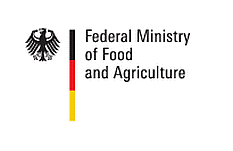EVA Background

The European Evaluation network EVA is modeled on a successful German national evaluation project EVA-II, which has been operational since 2001. EVA is being implemented with initial funding from the German Ministry of Agriculture for three years (2019-2022) and extended until the end of 2024. The project’s principles, framework and structure were developed during several ECPGR workshops between 2017 and 2019, also organized with the support of the German government.
The European Evaluation network EVA is modeled on a successful German national evaluation project EVA-II, which has been operational since 2001. Between 2017 and 2019, ECPGR projects funded by Germany aimed at promoting private public partnerships for the increased use of Plant Genetic Resources for Food and Agriculture (PGRFA) in European collections. They set the basis for the formulation, consensus building and establishment of an agreed framework at ECPGR level for the implementation of a European Evaluation Network (EVA).
Another output of these projects was the establishment of a Private Public Partnerships (PPP) Knowledge base that provides information about PPP examples in Europe with a focus on use of PGRFA.
During the 2018 ECPGR Steering Committee meeting in Thessaloniki, Greece, the framework for the establishment of a European Evaluation Network was approved, launching the implementation of the EVA projects.

A Memorandum of Understanding for enhanced collaboration between the European Seed Association (ESA - now EUROSEEDS) and ECPGR was also agreed for signature in 2018. In this MoU, Euroseeds and ECPGR agree to use their networks in a beneficial collaboration to promote the evaluation of PGR across Europe, supporting the European Evaluation Networks.
Two ECPGR workshops were subsequently held to facilitate the establishment of EVA networks for wheat and barley and for vegetables. During these meetings, participants from public institutions and private breeding companies came together to discuss options and draft a project proposal and plan for the coming years.
- ECPGR Workshop for the establishment of a European Evaluation Network (EVA) on wheat and barley, 27-28 November 2018, Berlin, Germany
- ECPGR Workshop for the establishment of a European Evaluation Network (EVA) on vegetables, 2-3 April 2019, Durres, Albania
Following up on these workshops, the ECPGR Secretariat submitted a successful proposal to Germany for funding of a project to kick-start the EVA networks on field crops (maize, wheat and barley) and vegetables (carrot, lettuce and pepper) for three years (2019-2022), which has been extended until March 2025 with additional funding.
This project was supplemented by funding from the European Commission within the framework of the Activated Genebank Network (AGENT) project (www.agent-project.eu, grant agreement 862613), which supported additional evaluations of wheat and barley in 2023 and 2024.
During the 2023 End-of-phase meeting of the ECPGR Steering Committee in Oeiras, Portugal, the EVA approach was incorporated into the regular ECPGR work programme as a priority action for Phase XI (2024-2028). As such, project coordination and support for data management within the project database EURISCO-EVA are guaranteed, allowing EVA networks to continue their operations based mainly on in-kind contributions towards activities.
Several ECPGR grant scheme activities support the implementation of EVA networks. The ForEVA project (2023-2024) of the Grain Legumes WG laid the groundwork for establishing a new EVA Legumes Network. The EuroPepLand project (2024-2026) of the Solanaceae WG implements a trans-European pepper landrace collection to extend the activities of the EVA Pepper network. The MALANIRS project (2024-2027) links the EVA Maize network with European projects Dromamed and MineLandDiv, generating genomic and Near InfraRed Spectral (NIRS) data to develop prediction models and new maize panels for evaluation.
In 2024, Germany granted a new project, EVA Boost (2024-2027), which supports implementation of the EVA Legumes network and activities towards establishing a new EVA network on perennial plants (fruit trees and berries).

and Agriculture for the period 2019-2027.

